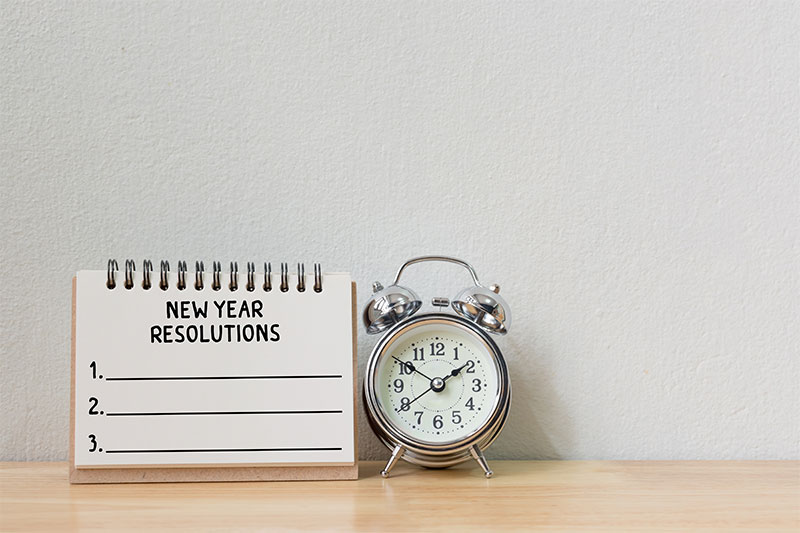Many New Year’s Resolutions center around becoming more healthy, proving that we all see that as a worthy goal. But statistically as few as 2% of people report that they achieve or even keep working toward their goals by the time the year ends.

Why such dismal failure? And what can you do in order to better assure success with the most common health-related resolutions, such as a desire to lose weight, quit smoking, eat healthier food, become more fit, or manage stress better?
Be reasonable

One of the first reasons why New Year’s resolutions fail is that goals may be unreasonable. Instead of saying “I’m going to lose 100 pounds,” tell yourself that you are going to lose 15 pounds. Plan to reward yourself (perhaps by buying $30 in new clothes) and set your next goal on the day you accomplish the first. Which brings us to the next strategy …
Be specific
Be specific in your goals, your rewards, timetables, and anything else related to your plan. Write down all of these details in a notebook, keep them handy and refer to them once a week or so. Don’t be afraid to update or adjust them as needed.
Have a plan

A map is always the best way to reach a destination. HOW do you plan to eat healthier? Finding out which foods are the most important to switch to organic is a good step. Cutting out processed foods and finding alternatives you can make instead is also important. Do your homework, and decide what steps you should take, which are most important, and break them into manageable pieces (such as changing only ONE food to organic per week, and changing ONE day per week to homemade lunches).
Keep yourself motivated

There are many ways to do this. Post a note where you will see it every day (maybe on the fridge to read before you grab a snack, or on the mirror to re-read while you brush your teeth). Are you losing weight? Take a pic of yourself (in your new “reward outfit”) and post it with your fridge-note. Are you quitting smoking? Put the money you would be spending on cigarettes in a separate account and use it to do something you’ve really looked forward to (and post a pic of your fun). Tell other people what you want to achieve — it’s harder to go back on your word if other people know about it.
Enlist support
Maybe there is a local group you can join related to your goal? Or find a friendly online forum to cheer you on. If you are already part of an in-person or online community, ask if others have similar goals and form a sub-group from friends you already know.
Anticipate setbacks

Not trying to be negative here, but difficulties will arise. Maybe you will be invited to a party but there will be lots of rich food. Tell yourself in advance, “I will eat from the veggie tray and drink sparkling water.” Repeat it out loud. Chances are very great that the suggestion will pull you through, and you’ll do exactly that! But if you don’t, or in any other case that you don’t stick to your plan, don’t think you’ve failed and give up. It’s like falling off a horse, get back up, dust yourself off, tell yourself you’ll do better next time and get right back on. It doesn’t hurt to remind yourself of how far you’ve come in spite of any setbacks.
Replace the bad with the good
Chances are, it was a bad habit of some sort that inspired your desire to change. And there is a competing good habit that will help you reach your goal. If it was poor food choices that led to your problem, find a healthy food item you love to replace it. Smoking robbing your health? Many ex-smokers take up jogging to increase lung capacity and provide extra motivation to quit.
Use these strategies to help you successfully achieve your goals

You may even find that once your confidence is raised by your achievements, you look forward to tackling even more goals. The end result can be a changed life.


